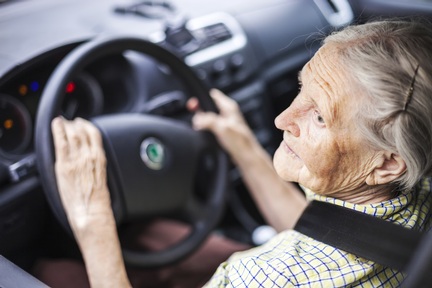Doctor warns of dangers of driving with dementia
Drivers with early stage dementia could be putting themselves and members of the public at risk.
A doctor from Derbyshire, has requested a review at the BMA Annual Representative Meeting, calling for the BMA Board of Science to look into problems relating to impaired judgement in older drivers, specifically those with early onset dementia.

The doctor requesting the review, Dr Peter Holden, said: “Driving is a complex psychomotor activity requiring many faculties to be integrated, of course in dementia you can’t integrate them. While you may tick the box for having adequate vision, adequate hearing or adequate musculoskeletal abilities, you may not have the brainpower to put that lot together. Everyone regards a driving licence as a right, but it’s a privilege, a privilege to hold a lethal weapon.
“The concern is, confront them with something sudden and they won’t be able to cope because it breaks the routine. My great concern is that one day we will be faced with something like that and God forbid, [someone will] put a car into a line of children.”
Current guidelines indicate that people living with dementia can continue driving, however they should notify the Driver and Vehicle Licensing Agency (DVLA) in England, Scotland and Wales or Driver and Vehicle Licensing Northern Ireland (DVLNI) or they could face a £1,000 fine.
A dementia diagnosis does not mean that someone should stop driving straightaway, as many people living with dementia are able to remain driving safely for some time.
As the effects of dementia become more prominent, reaction times, perception and memory can prevent a driver from carrying out simple driving tasks. Research suggests that people living with a dementia diagnosis cease driving after three years.
Speaking about Dr Holden’s comments, head of policy at Alzheimer’s Society, George McNamara said: “Scaremongering is not helpful in making rational decisions in this area. A dementia diagnosis is not in itself a reason to stop driving. The critical issue, both legally and practically, is whether an individual is able to drive safely. This decision requires individual judgments which can be clinically difficult and need sensitive handling.
“We are working with the DVLA and others to provide greater clarity on how this assessment should best be done. We would support the issuing of more guidance in this area for clinicians, people with dementia and those supporting them.”
Latest News Analysis
 04-Sep-19
Extra £1.5 billion announced for social care in Chancellor's Spending Review
04-Sep-19
Extra £1.5 billion announced for social care in Chancellor's Spending Review
 02-Jul-19
Department of Health forced to rethink care homes' nursing rates after legal challenge
02-Jul-19
Department of Health forced to rethink care homes' nursing rates after legal challenge
 18-Jun-19
Overnight care workers forced to sleep in offices and told 'bring your own bedding'
18-Jun-19
Overnight care workers forced to sleep in offices and told 'bring your own bedding'
 14-Jun-19
Back in the closet: Third of care home staff have had no LGBT+ awareness training
14-Jun-19
Back in the closet: Third of care home staff have had no LGBT+ awareness training
 11-Jun-19
PM candidates on social care: Rory Stewart calls fixing care an 'unfinished revolution'
11-Jun-19
PM candidates on social care: Rory Stewart calls fixing care an 'unfinished revolution'